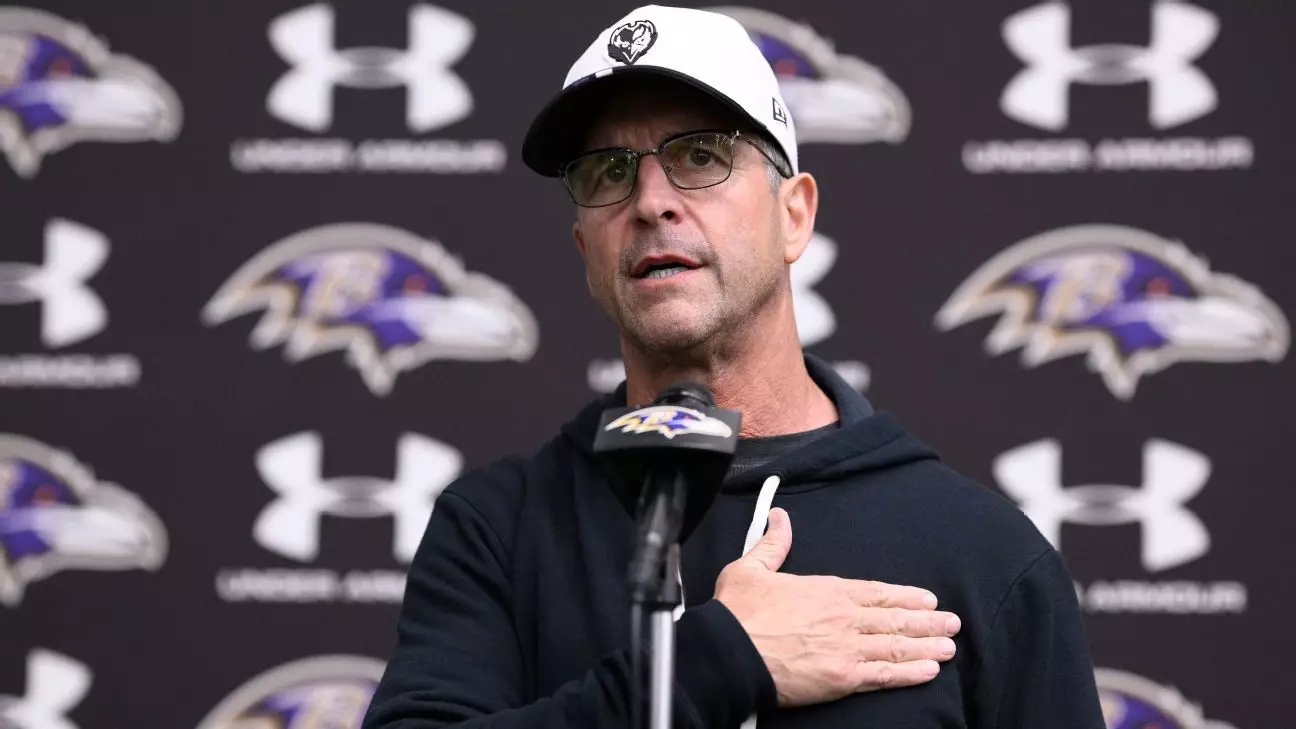In an unforeseen and tumultuous turn of events, the Baltimore Ravens made a decision that shook the very foundation of their kicking game by releasing Justin Tucker. Known as one of the NFL’s all-time great kickers, this move reverberates beyond mere statistics or performance metrics; it is a deeply layered decision fraught with implications that affect the entire team dynamic. During a press conference following the decision, Ravens head coach John Harbaugh elucidated how complex this choice had been, indicating that it involved multiple members of the organizational leadership, including owner Steve Bisciotti and general manager Eric DeCosta.
The timing of Tucker’s release on May 5, amid serious allegations of sexual misconduct, reverberated throughout the league and sent shockwaves through the Ravens’ locker room. While Tucker has publicly denied these allegations, claiming them to be “unequivocally false,” the organization had to make a strategic decision focused not solely on football metrics but also on the reputation and well-being of the franchise.
Aligning Values with Performance
Tucker’s history as the NFL’s most accurate kicker adds another layer of complexity to this situation. Harbaugh’s statements reflect a nuanced approach to decision-making, where “football decisions” aren’t solely reliant on on-field performance but embody broader issues enveloped in ethics and accountability. Yes, Tucker’s 2022 season was subpar—he recorded a 73.3% conversion rate on field goals, the lowest of his illustrious career—but the Ravens had previously stated they would await the NFL’s investigation before making any moves related to him.
By cutting Tucker nine days after selecting rookie kicker Tyler Loop in the draft, the Ravens signaled an urgent need for change, instigated not just by immediate performance metrics but also by an ethical imperative to uphold the integrity of their organization. If a team is to thrive, all members must embody shared values both on and off the field. This may very well have been the uncomfortable but necessary calculus that led the Ravens down this path of action.
The Unfolding Moral Dilemma
The moral implications of this decision cannot be understated. Tucker’s release is emblematic of a larger reckoning occurring in the realm of professional sports, where questions of accountability and moral integrity take center stage. In the landscape of the NFL, where accusations of misconduct have unfortunately become alarmingly commonplace, the Ravens seemed dedicated to making a statement—one that signifies zero tolerance for any behavior that threatens the team’s reputation.
When discussing potential fallout from this decision, Harbaugh framed the matter with a sense of urgency, articulating a clear need to prepare adequately for the upcoming season. “We have to have a kicker out there making kicks,” he emphasized, pivoting the conversation back to performance. However, this was not an ordinary case of simple roster changes; it was an essential commentary on how the franchise chooses to navigate its public image in conjunction with sporting success.
The Future of Kicking in Baltimore
Currently, Baltimore is embroiled in a competitive battle between Loop and undrafted rookie kicker John Hoyland from Wyoming. The organization’s faith in these young talents echoes a significant moment in history for the Ravens—the last time they relied on a rookie kicker was when they drafted Tucker in 2012, a move that ultimately culminated in a Super Bowl victory. Yet this time, the stakes feel higher, given the shadow of Tucker’s recent issues.
Critics might question the wisdom of placing trust in untested rookie talent for a franchise with championship aspirations. Harbaugh, however, remains undeterred, conveying a belief that risk is an inherent aspect of sporting life. He articulated a familiar sentiment: “There are risks in life,” pointing out that even everyday activities bear their own uncertainties. This philosophy invites consideration of the balance organizations must strike between the present challenges and future possibilities.
A Legacy in Limbo
As Justin Tucker looks ahead, his legacy hangs in a precarious position. The kicker’s monumental achievements—including seven Pro Bowls—will forever be complemented by the controversies surrounding his abrupt exit from the Ravens. Meanwhile, Baltimore finds itself at a crossroads, tasked with building a team capable of championship glory while navigating the murky waters of player conduct and public perception.
In this setting, one can’t help but wonder: is releasing a franchise cornerstone ultimately a decision grounded in football, or is the heart of the matter much more intricate and essential to the team’s identity? It appears that for the Ravens, the answer is as layered as the decision-making process itself, revealing a multifaceted outlook on success, responsibility, and integrity.


Leave a Reply